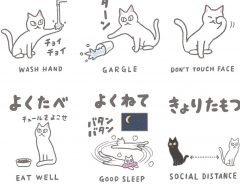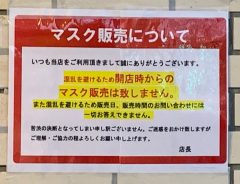- Tags:
- cooled mask / coronavirus / COVID-19 / Knit Waizu / Mask
Related Article
-

Manga Artist’s Cute COVID-19 Prevention Posters Available for Free
-

Hokkaido zoo and manga artists team up to protect animals during pandemic
-

Crisis in Hanamachi – Saving Kyoto’s Geisha from COVID-19
-

Japanese drugstore commended for sign posted, mask-selling policy
-

Virus-infected owners should avoid contact with their pets, Japanese vet society warns
-

13-year-old donates over 600 handmade sickness masks amid shortage in Japan



Masks have been on the tip of everyone's tongue, here in Japan and across the larger international community. While their effect against the COVID-19 infection has been called into question, it still seems that consumers prefer to don surgical masks when they are forced to be out and about. And with the coronavirus monopolizing news coverage, the demand across the country is overwhelming manufacturers and suppliers.
Needless to say, mask-strapped consumers, innovative as they are, are finding new creative ways to cope with the current lack of surgical coverings. Japanese YouTubers are demonstrating how to make DIY masks from household products, Twitter users are showcasing their home-made artisanal masks, and mothers are making ninja masks imbued with special powers. In more bizarre—or desperate?—situations, users are converting bras into masks and decorating their creepy/cute cat-shaped dumplings with masks.. Makes perfect sense.
Indeed, COVID-19 is a mask-maker's dream—if nothing else, it's a seller's market. While fortunately price-gouging has been kept to a minimum, some retailers are employing novel ways to make their hygienic products just a smidge more competitive. Vendors in Yamagata, for example, likely have the latest leg up.
Panic Buying and Shortages in Japan
In terms of panic buying, Japan was ahead of the curve. As the reality of the respiratory pandemic set it in early March, consumers took to grocery stores and, among other things, snatched up all the toilet paper.
Their panic buying was rumor-fueled and likely unnecessary. Nevertheless, consumers’ behavior caused a spike in prices and led the chairman of the Japan Tissue Industry Association to plea with residents. “There are plenty [of supplies]. We would like consumers to take action based on correct information.” Toilet paper manufacturers saw orders jump as shelves were quickly emptied.
Other supplies were also affected. Hand sanitizer and diapers were also snatched up as quickly as they were stocked. In some cases, pharmacy staff were practically overwhelmed by desperate and aggressive customers.
Fortunately, as the initial stages of panic buying progressed, government officials quickly addressed reselling and price gauging. As small packages of masks reportedly sold for nearly 100,000 JPY ($930), the trade ministry announced rules limiting reselling. The new rules implied a one-year prison term or a 1 million JPY ($9,800) fine for anyone in violation.
A Cool Alternative
More recently, it seems cloth masks are becoming more common in Japan. One Yamagata knitwear manufacturer, Knit Waizu, is capitalizing on this trend by selling their knitted masks with a twist. Their items are available in cooled vending machines.
The company began producing masks during the March shortage as temperatures began to rise across the country. Noticing an opportunity, they begin storing their masks in cooled vending machines. The masks are kept at a frosty 4 degrees Celsius and are available for 690 JPY ($6.40). The company reportedly sells about 400 a day.
According to a Japan Times article covering the masks, wearing face masks in hot weather can cause particular problems. Specifically, masks make it difficult for cool air to reach the lungs causing heat to build up inside the body. This stresses the respiratory system and can cause widespread difficulties.
Coverage on ANN
Word-of-mouth has definitely been spreading about the masks. ANN News recently covered the item in a short video. Check it out:
According to the video, the masks are sold in a vending machine among typical items such as beverages. The cooled masks feel very good, but, of course, they soon lose their freshness and become room-temperature. Nevertheless, the masks, which are often made from lightweight yukatas, will be sold from the vending machine for the foreseeable future.
Some commenters on the video expressed an interest:
“Refreshing!”
“Wow! That’s so cold.”
“I bought one of these before.”
But others were thrown off by the price:
“That’s way too expensive”
“610 yen for one mask!!!”
“At this price...you need to get your head examined."